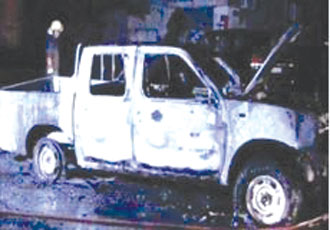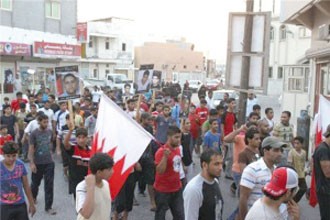
|
 |
 |
|
|
|
|
|
|
|
|
|
|
|
|
|
|
|
|
|
|
|
|
|
|
Debate over Judicial Decision
|
 |
| سيارة الضحية التي هوجمت بالقنابل الحارقة |
On 10 July 2010, the Secretary-General of the Bahrain Human Rights Society, Abdula Al-Drazi described the verdict in the Al-Ma’meer Case as politically motivated decision, which aimed at intimidating the citizens. On 16 July 2010, the opposing political societies, including Al Wifaq Society, issued a joint statement in which they indirectly condemned the violence of the security forces and street violence and incitement. It also stressed the importance of adopting a peaceful approach to political action, avoiding violence and what might hinder national unity and civil peace.
Despite the fact that the statement expressed its deep respect for the judiciary in promoting truth, freedom and the law, it doubted that just and fair trials can be guaranteed. Thus, during an open and licensed assembly on 10 July 2010, the societies demanded the release of the detainees.
What’s Criminal? What’s Political?
 |
| Protest against the ruling |
The Al- Ma’meer case, or similarly the Karazacan case, would not have triggered this much controversy in the legal and political field, if it hadn’t been for the fact that both cases impact on politics. On one hand, the Judiciary insisted on dealing with the Ma’ameer incident as a criminal case i.e. (individuals attacking a car assuming that it belongs to the police and using bombs with the intention of causing harm). On the other hand, advocates of violence from the opposition believe that the case is political and represents ‘a Government’s attempt to suppress freedom of expression by accusing individuals who were expressing themselves peacefully of murder’- which is not the case. There is a moderate third party as in the statement of the political societies. Their position takes into consideration their political interests and that is why they had to condemn advocates of violence as this harms society at large and does not help in achieving political goals. But they also had to condemn the verdict and describe it as ‘political and unjust’.
It is necessary to highlight the following:
Firstly: what occurred in the Al-Ma’meer and Karazcan cases is the murder of two victims as a result of irrational violence involving the use of bombs with the intention of causing harm. This act is a crime that cannot be justified as a peaceful form of expression. This is something that all parties have agreed upon including the Government, opposition and civil society organisations.
Secondly: the case has two clear sides: criminal and political dimensions. Therefore, it is not possible to approach this case from a criminal perspective alone or merely a political one. For the incident occurred in the context of riots and politicised violence backed by political instigators. Also, the purpose behind riots and vandalism is completely political. In addition to this, those directly involved in violence are perceived politically-motivated. Also, the media coverage of the incident, as well as society, believe that rioting is political and rioters are a tool in politics. In fact, even the backgrounds of the defending lawyers are political. For some of them are not only members, but also leaders in political opposition parties. Therefore, it is not possible to simplify the Al-Ma’ameer case as being a criminal case only.
However, this does not justify the crime and it is not possible to acquit the criminals on the basis that it is a political case. There is concern that the number of innocent victims will increase if such criminals are not punished. Even if the crime can be described as political crime, the lives of people cannot be risked as the very philosophy behind punishment is protecting society, achieving justice and deterrence. Those who demand that the accused be released immediately cannot guarantee that such acts will not occur again by politically incited youths. Perhaps, if not for the legal pursuit of the Ma’ameer and Karazcan perpetrators, the number of Molotov victims would be much higher.
Thirdly: even if there was any shortcoming in any aspect of the trial such as a lack of transparency in the investigation resulting in forced confessions or torture or preventing lawyers from attending investigations, the essential point is that a murder took place and should not be dealt with leniently whether it is described as criminal or political. Also, the accused have the right to a fair trial in all stages of the legal and judicial process.
